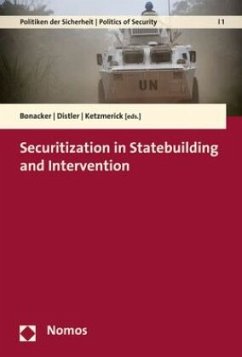Critical security studies have emphasized that the identification of security threats paves the way for international and domestic interventions. Over the last three decades, statebuilding has developed into a powerful global practice of intervention in domestic affairs - not only with respect to failed states, but more broadly as a tool used in development cooperation and governance assistance. Statebuilding is increasingly framed as a policy which can enhance international, as well as domestic, security and peace, and yet historical and contemporary examples of statebuilding have often involved considerable violence. This volume draws on securitization studies to analyze the role of security in international and domestic statebuilding interventions. Individual case studies explore international statebuilding in Libya, Iraq, Kosovo, and Cameroon, discourses of intervention in the USA, and internal statebuilding in Turkey, Mexico, Tajikistan and South Sudan. These empirical investigations offer a compelling insight into the multiplicity, and global character, of security dynamics.
Bitte wählen Sie Ihr Anliegen aus.
Rechnungen
Retourenschein anfordern
Bestellstatus
Storno

